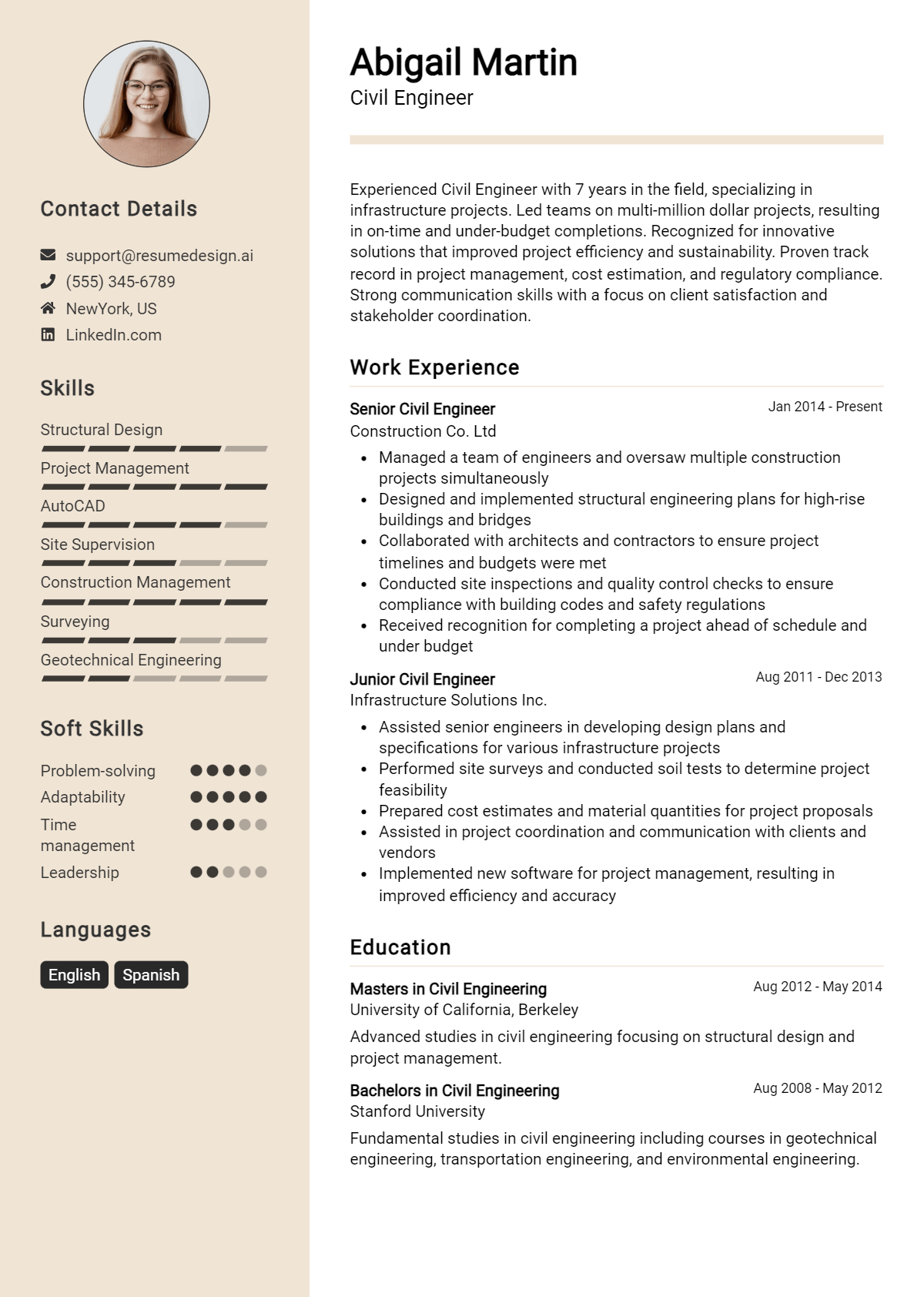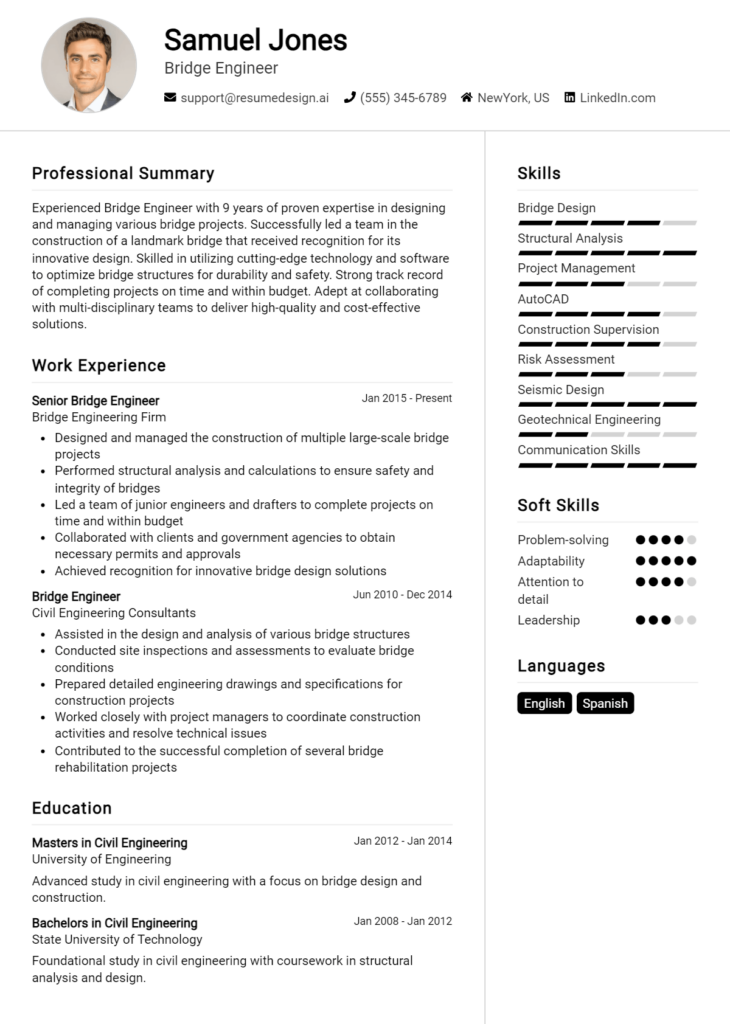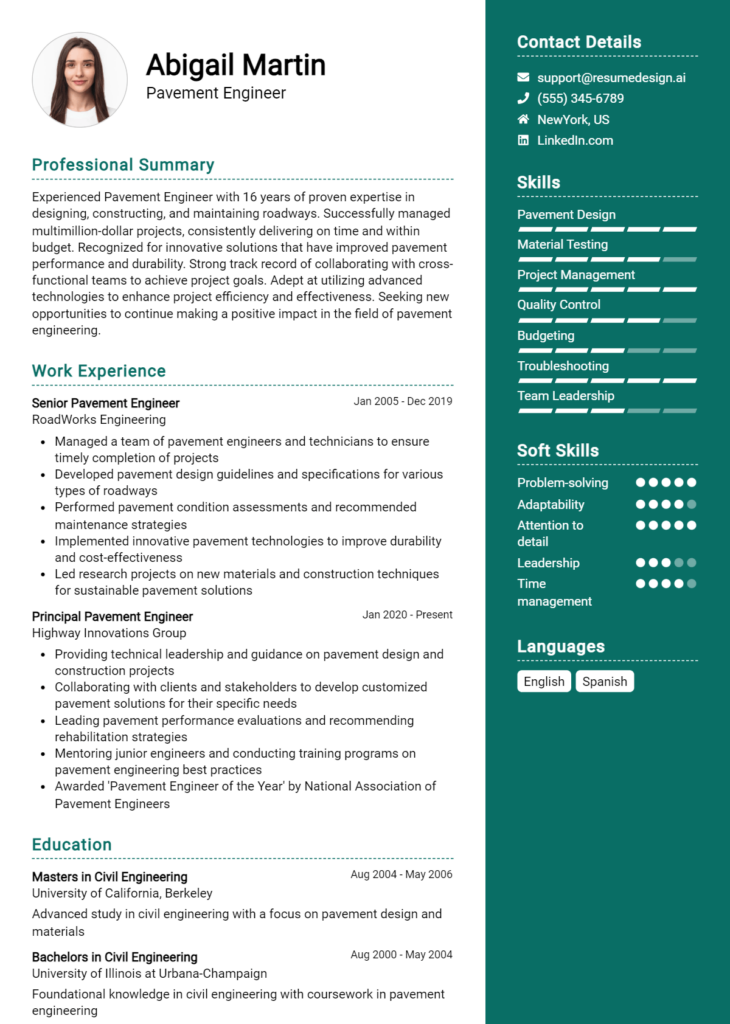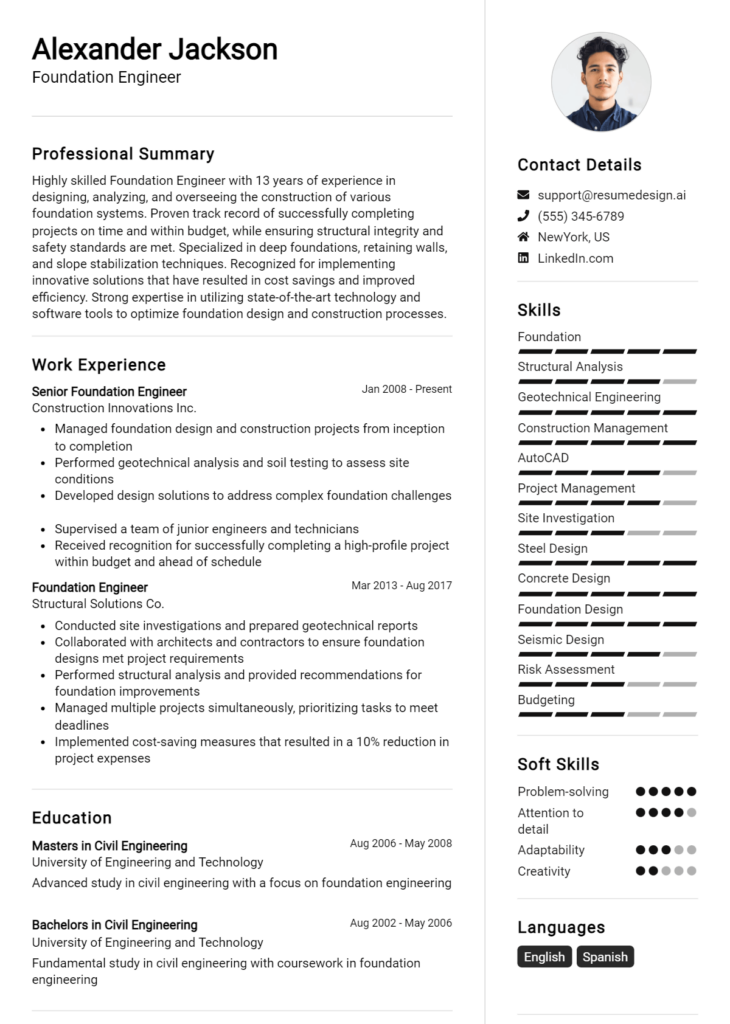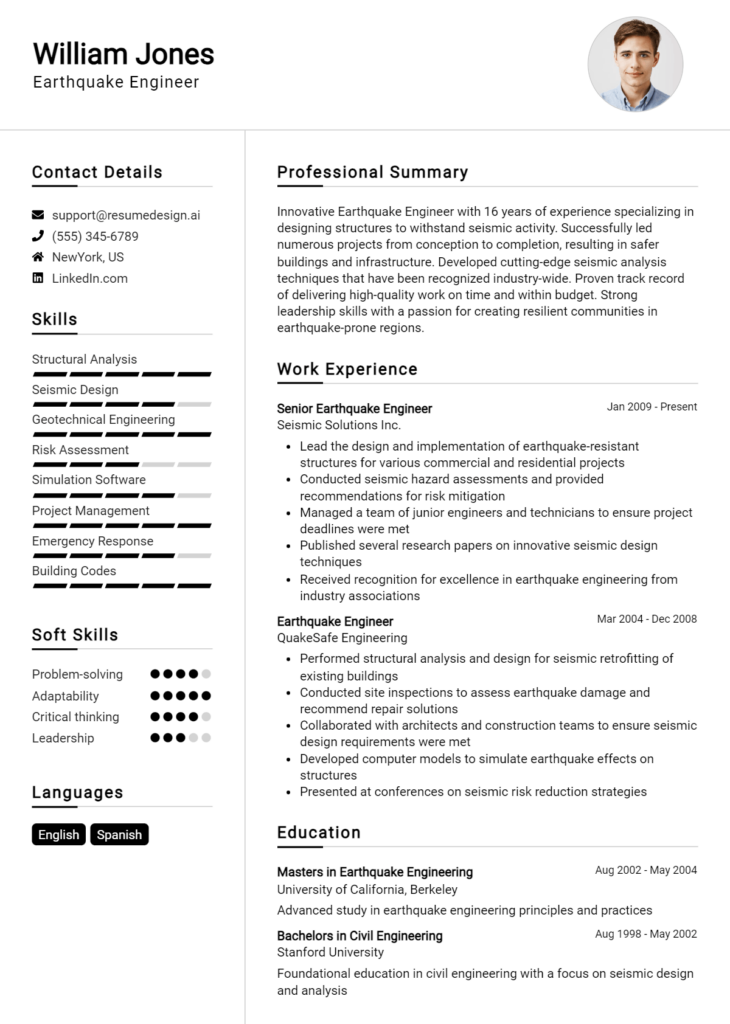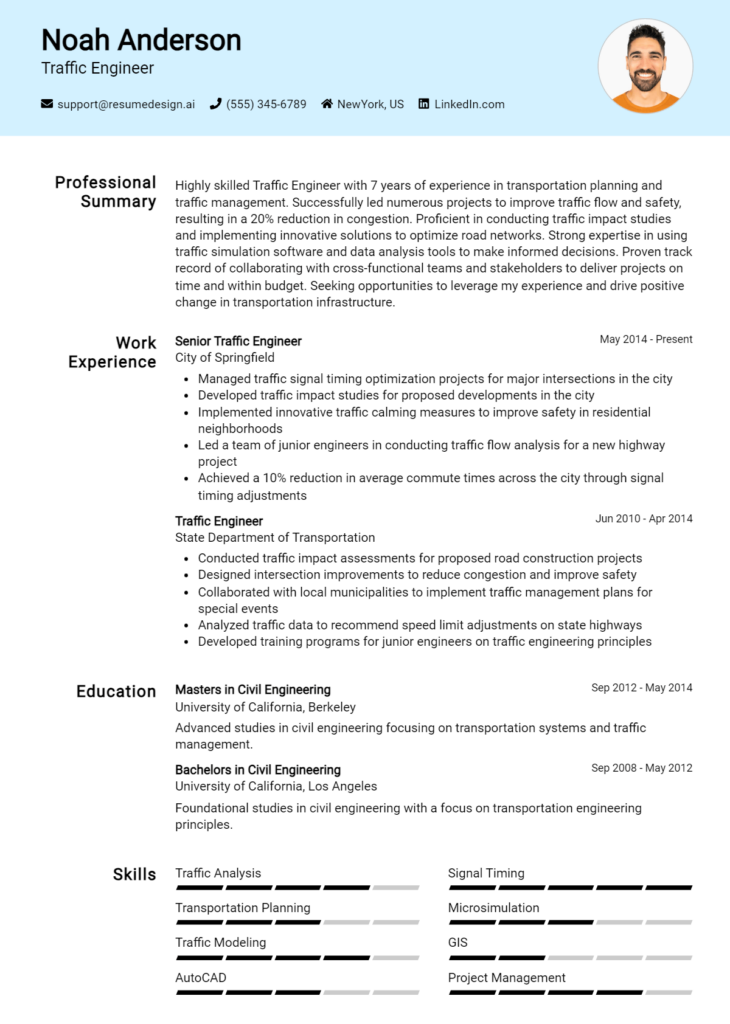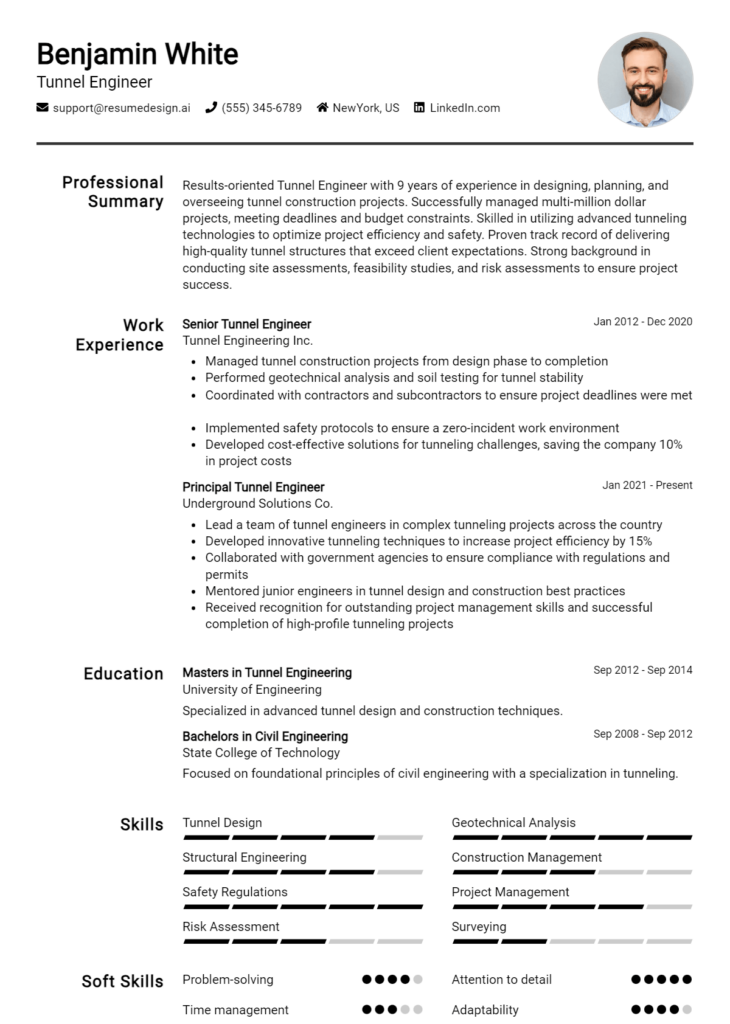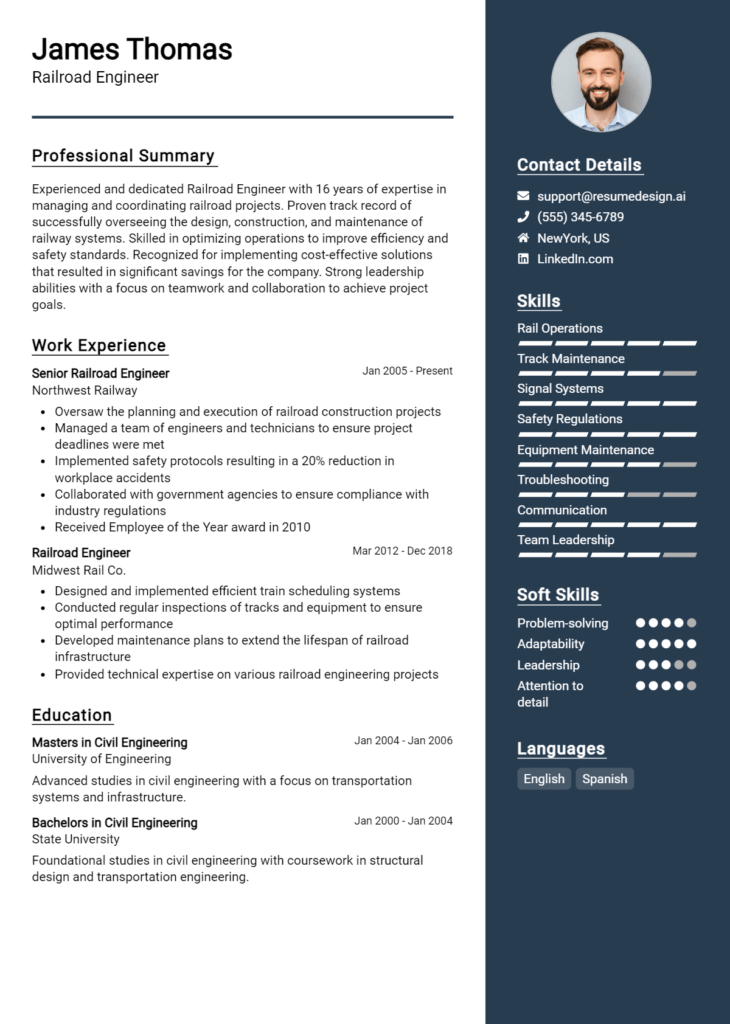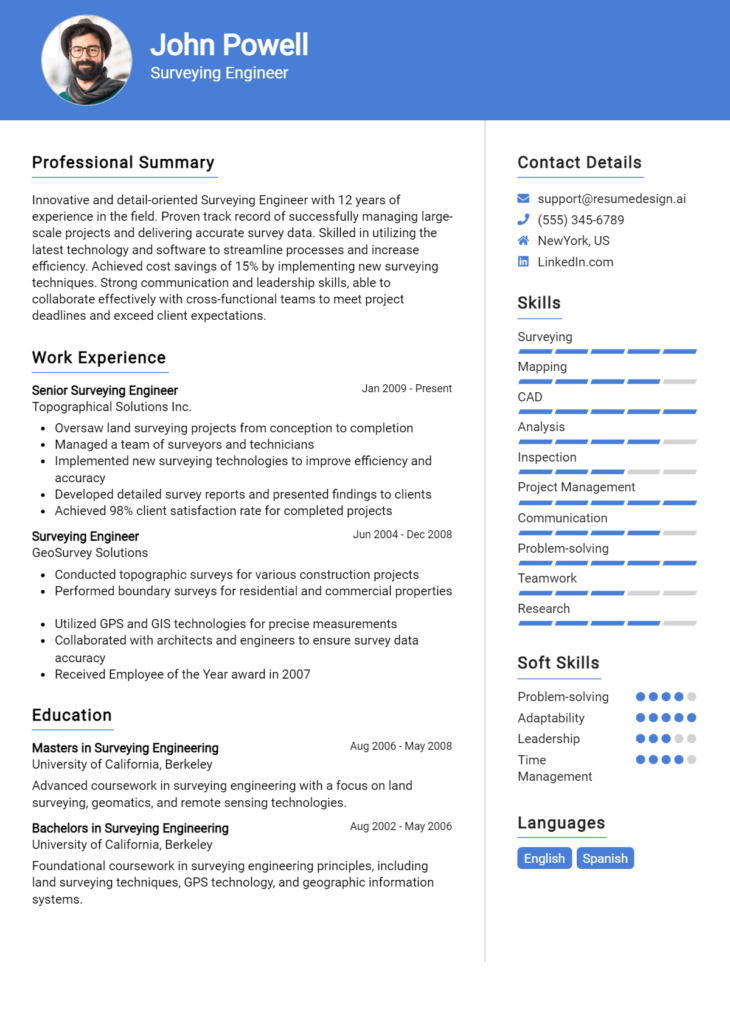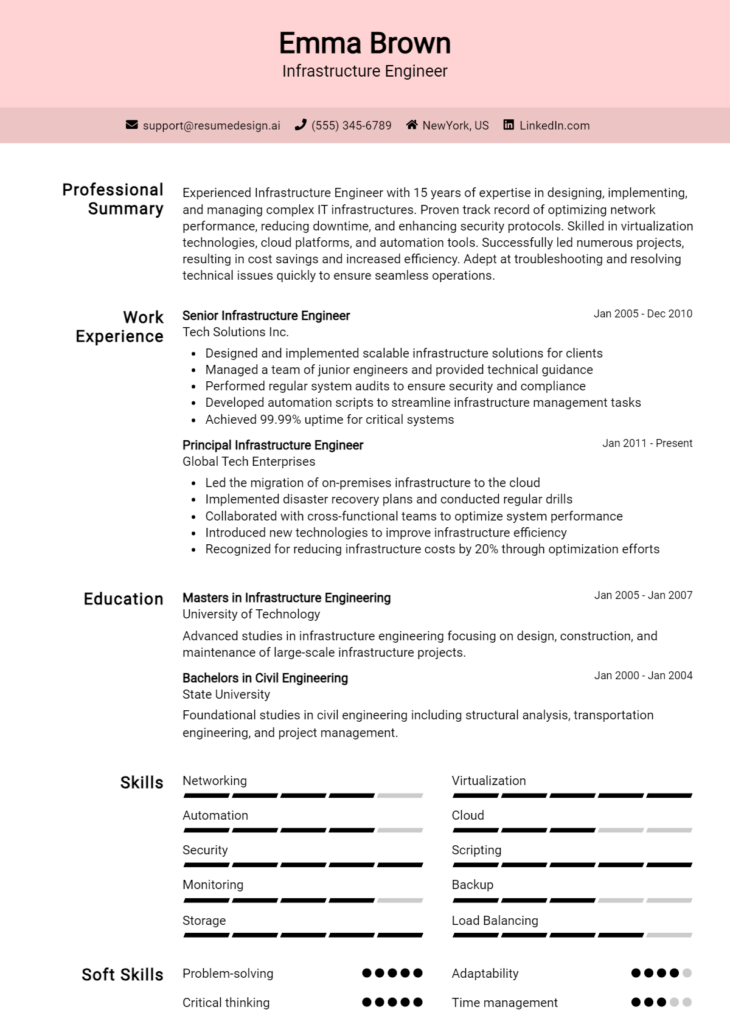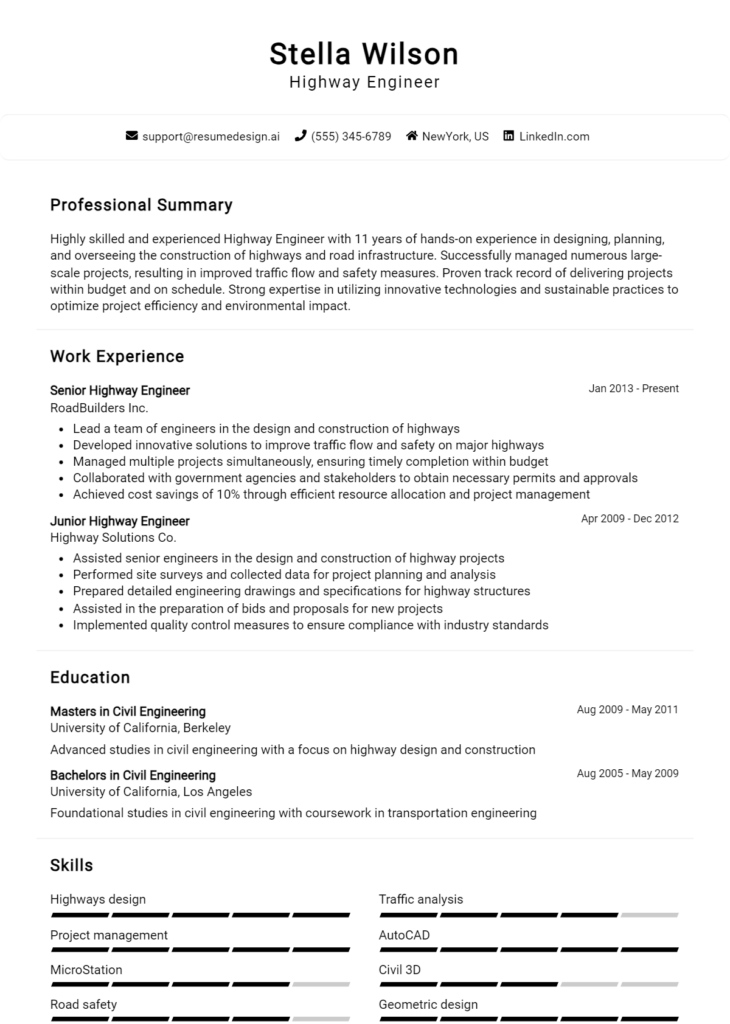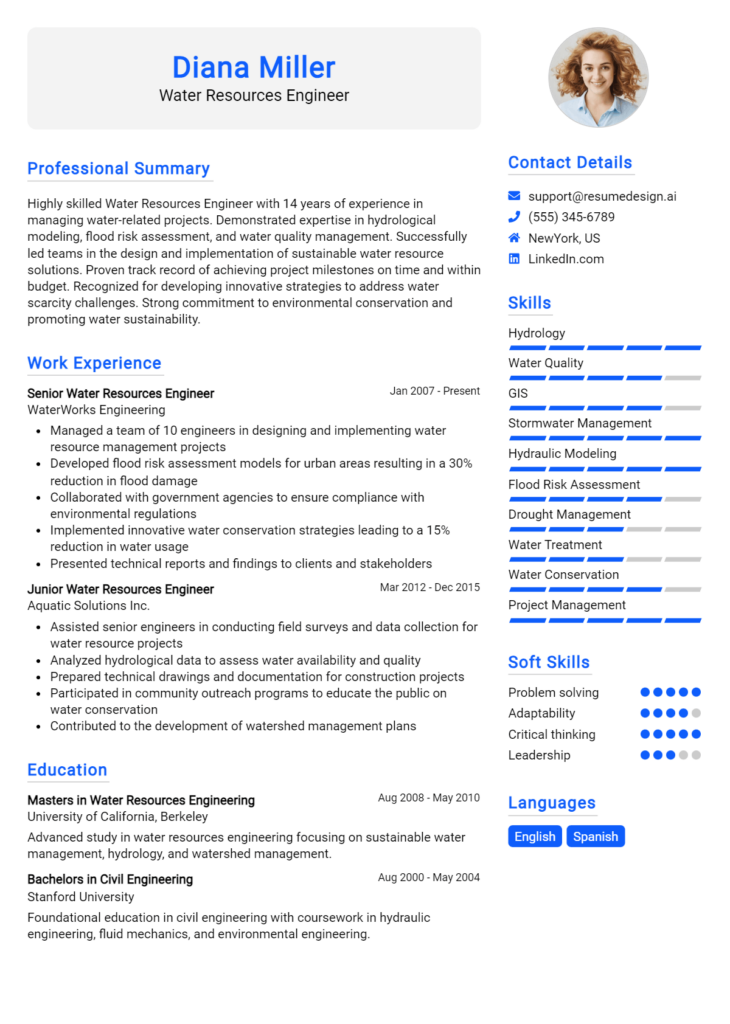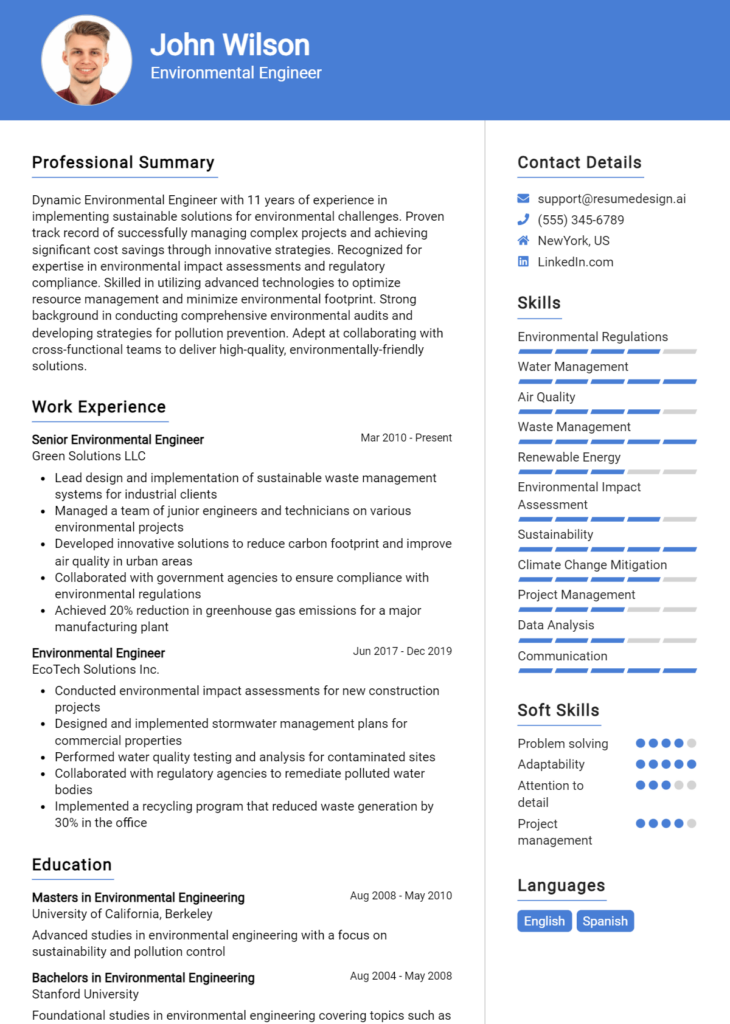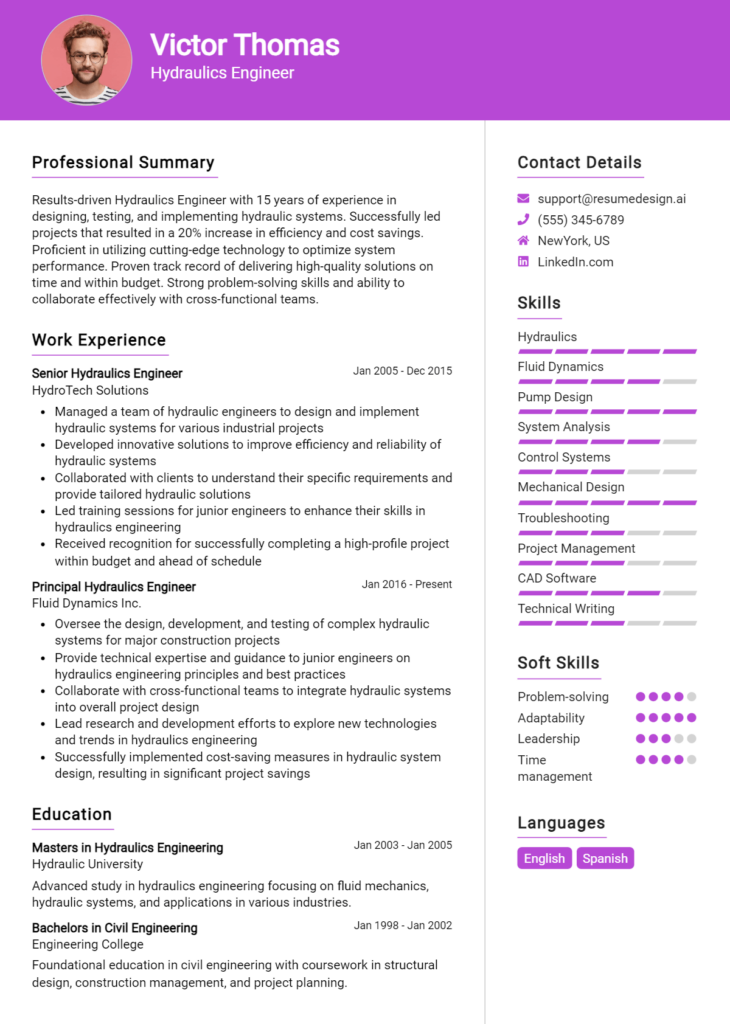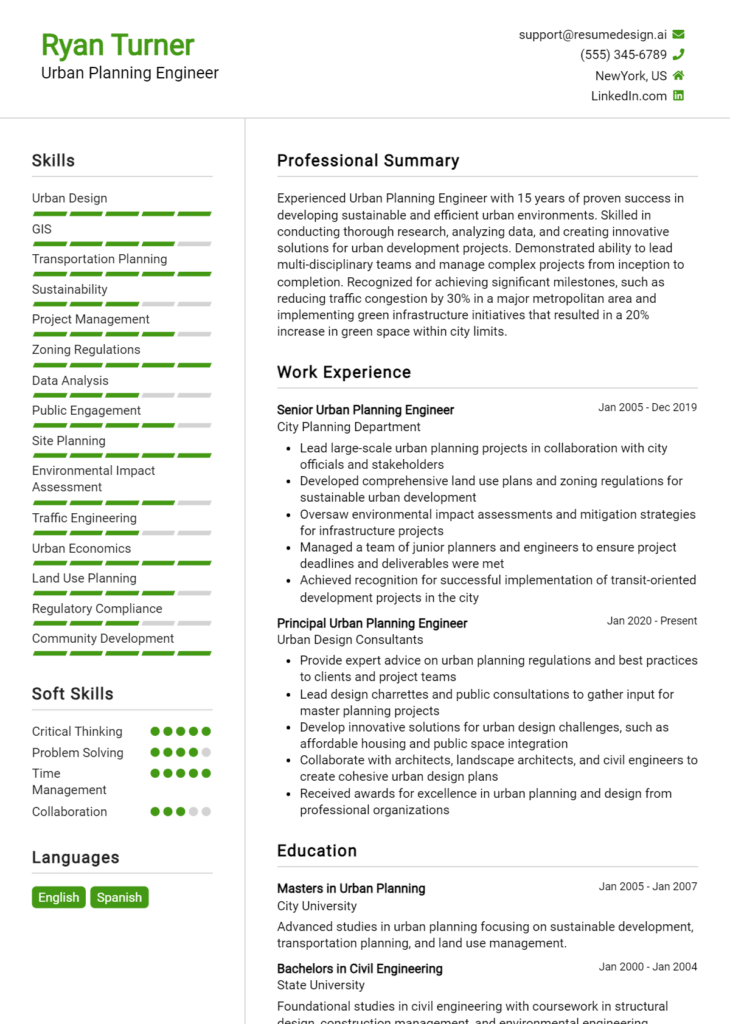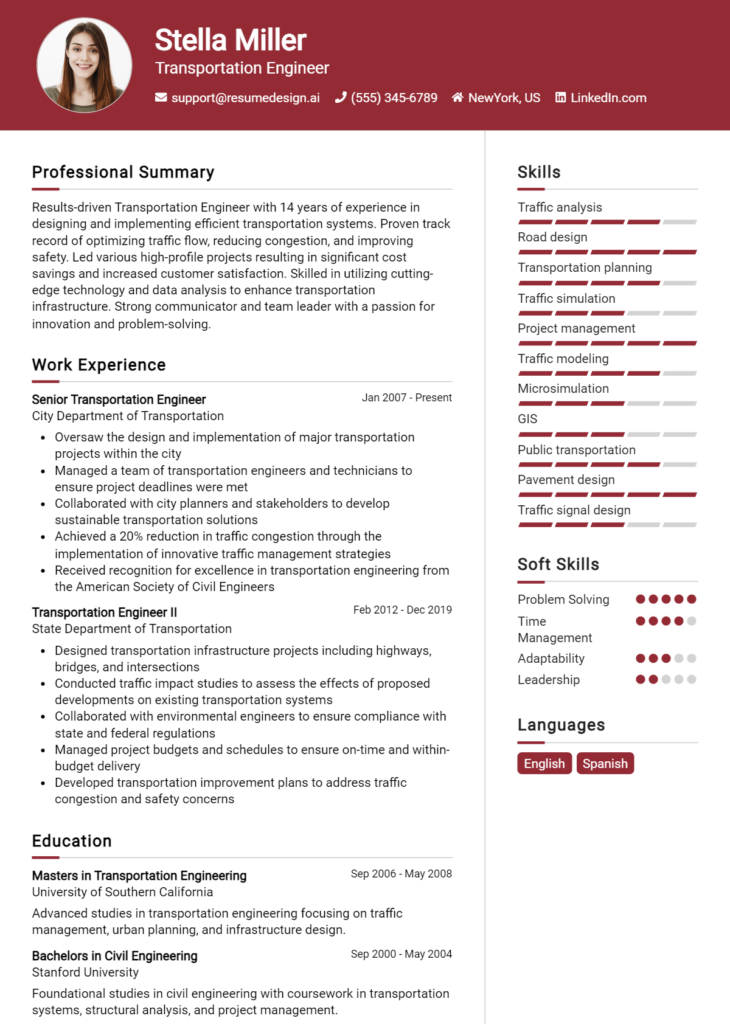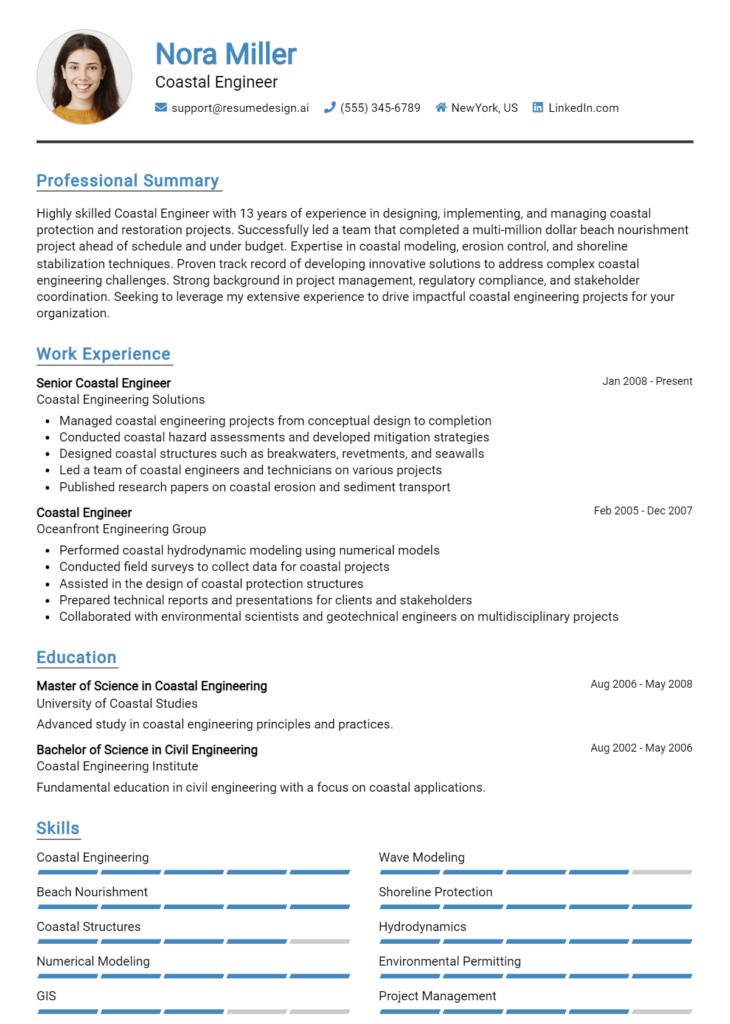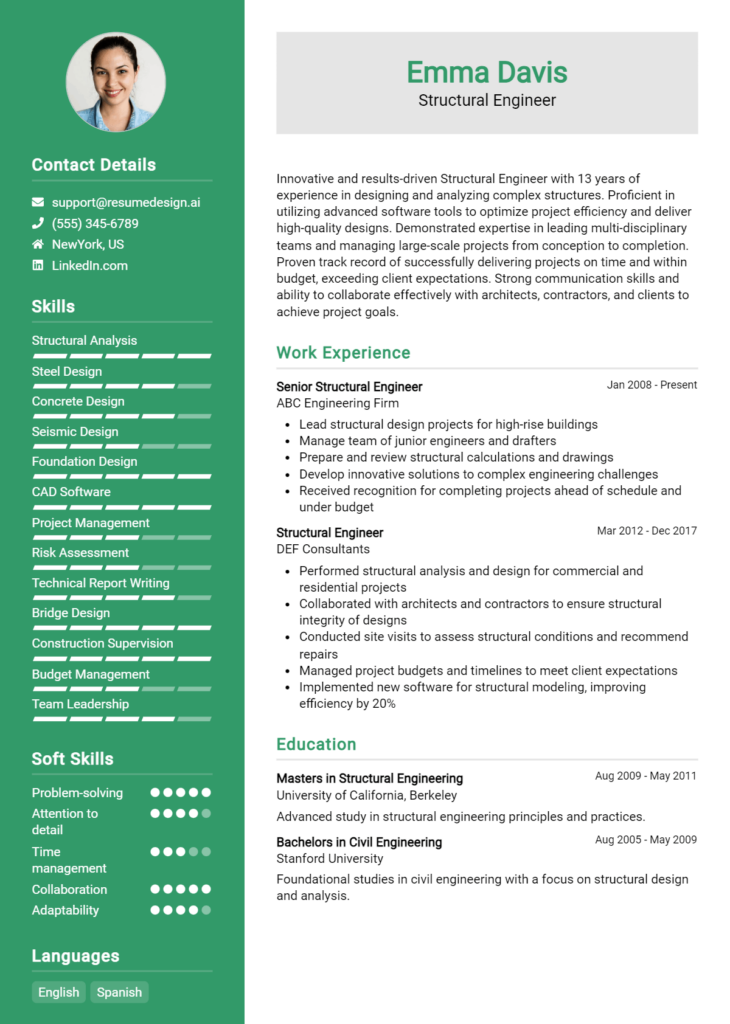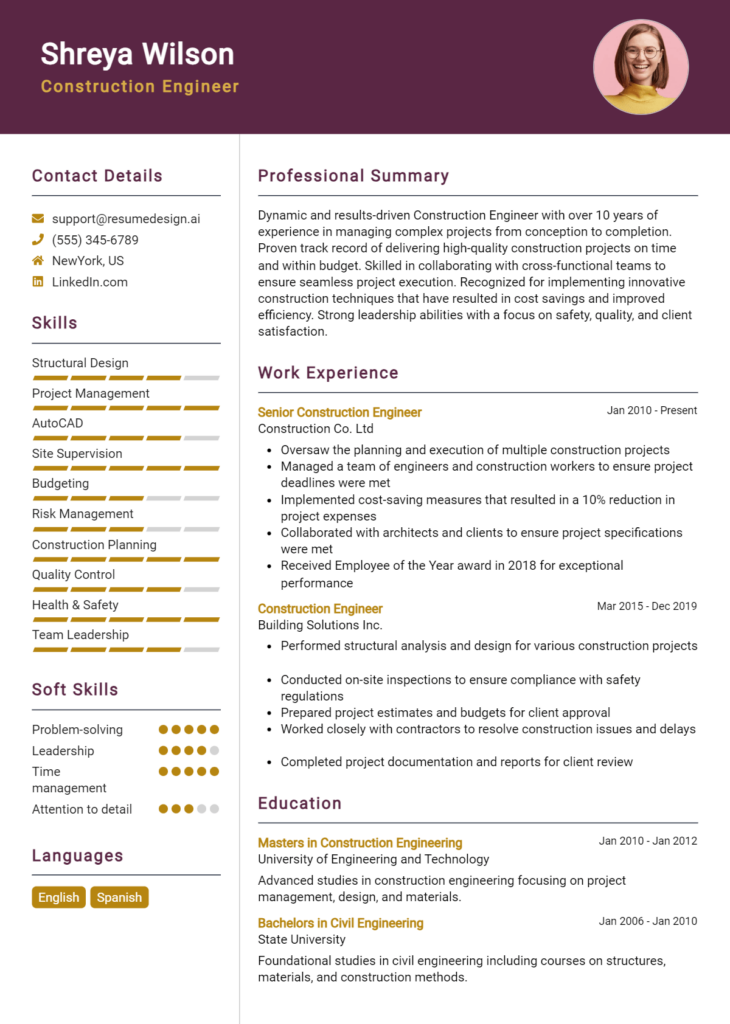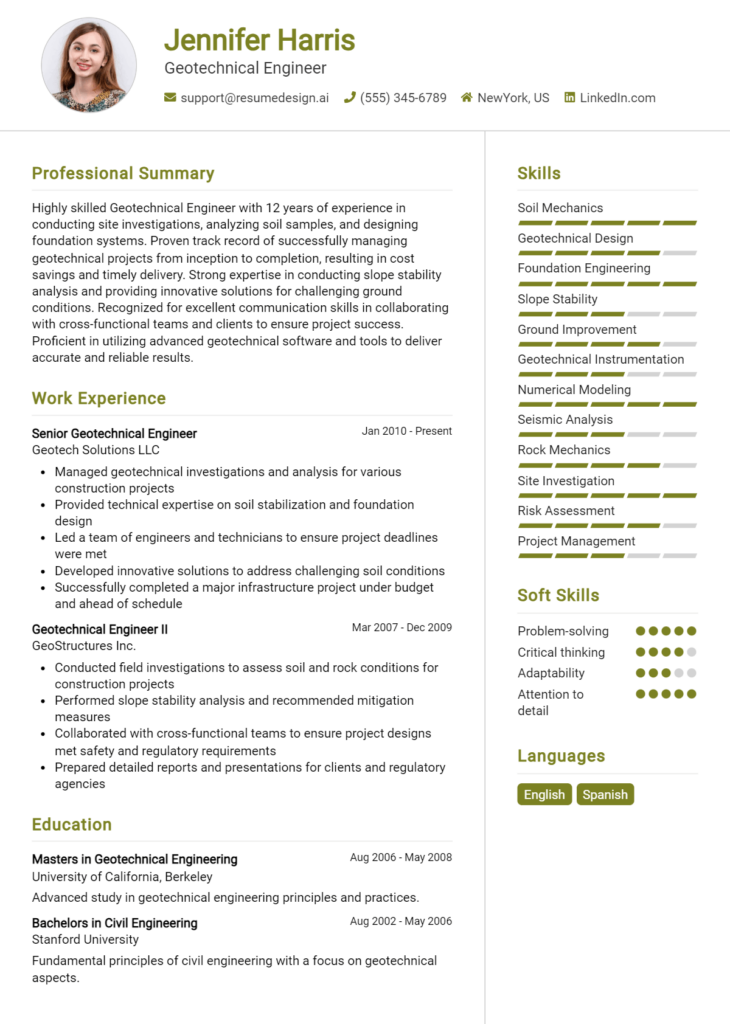Civil Engineer Core Responsibilities
A Civil Engineer plays a crucial role in the design, construction, and maintenance of infrastructure projects, bridging the gap between various departments such as architecture, environmental science, and project management. Key responsibilities include conducting feasibility studies, ensuring regulatory compliance, and collaborating with multidisciplinary teams. Essential skills encompass technical proficiency, operational insight, and strong problem-solving abilities, which are vital for meeting organizational goals. A well-structured resume can effectively highlight these qualifications, showcasing the candidate's readiness to contribute to successful engineering projects.
Common Responsibilities Listed on Civil Engineer Resume
- Design and analyze civil engineering projects such as roads, bridges, and buildings.
- Conduct site investigations and feasibility studies.
- Prepare and review project specifications and reports.
- Ensure compliance with safety standards and regulations.
- Collaborate with architects, contractors, and other engineers.
- Manage project budgets and timelines effectively.
- Perform risk assessments and develop mitigation strategies.
- Utilize software tools for design and analysis.
- Monitor construction progress and provide technical guidance.
- Participate in project meetings and present findings to stakeholders.
- Conduct environmental impact assessments.
- Oversee quality control measures throughout the project lifecycle.
High-Level Resume Tips for Civil Engineer Professionals
In the competitive field of civil engineering, a well-crafted resume is not just a document—it's your first opportunity to make a lasting impression on potential employers. Your resume serves as a vital marketing tool that showcases your unique skills, experiences, and accomplishments, setting you apart from other candidates. It needs to not only highlight your technical expertise and project management capabilities but also reflect your achievements in a way that resonates with hiring managers. In this guide, we will provide practical and actionable resume tips specifically tailored for civil engineer professionals to help you create a standout resume that effectively communicates your value.
Top Resume Tips for Civil Engineer Professionals
- Tailor your resume to each job description by incorporating relevant keywords and phrases that align with the specific role you are applying for.
- Highlight your most relevant experience by organizing your work history in reverse chronological order, focusing on positions that are directly related to civil engineering.
- Quantify your achievements with specific metrics, such as cost savings, project timelines, or successful completion rates, to demonstrate the impact of your contributions.
- Showcase your technical skills, such as proficiency in design software (e.g., AutoCAD, Civil 3D), project management tools, and engineering methodologies.
- Include certifications and licenses relevant to civil engineering, such as Professional Engineer (PE) or Engineer in Training (EIT), to enhance your credibility.
- Use action verbs to start each bullet point under your experience section, conveying a sense of proactivity and leadership.
- Incorporate relevant projects in a dedicated section, detailing your role, the outcome, and any innovative solutions you contributed.
- Keep your resume clear and concise, ideally one page for early-career engineers and no more than two pages for those with extensive experience.
- Utilize a clean and professional format with consistent fonts, spacing, and headings to enhance readability and overall presentation.
- Proofread your resume multiple times to eliminate any grammatical errors or typos, as these can undermine your professionalism and attention to detail.
By implementing these tips, you can significantly enhance your resume, making it more appealing to potential employers in the civil engineering field. A polished and targeted resume not only demonstrates your qualifications but also showcases your commitment to professionalism, ultimately increasing your chances of landing that desired job.
Why Resume Headlines & Titles are Important for Civil Engineer
In the competitive field of civil engineering, a well-crafted resume headline or title serves as a critical first impression that can set the tone for the entire application. A strong headline immediately grabs the attention of hiring managers, succinctly summarizing a candidate's key qualifications and expertise in just a few impactful words. This concise statement not only highlights relevant skills and experience but also aligns directly with the job being applied for, making it easier for recruiters to assess a candidate's fit for the role at a glance. Therefore, creating a compelling resume headline is essential for civil engineers seeking to stand out in a crowded job market.
Best Practices for Crafting Resume Headlines for Civil Engineer
- Be concise: Limit your headline to one or two impactful phrases.
- Be specific: Tailor your headline to reflect the specific civil engineering role you are applying for.
- Highlight key qualifications: Include essential skills, certifications, or experiences that align with the job description.
- Use action-oriented language: Start with strong action verbs or descriptive adjectives to create an impactful impression.
- Incorporate industry terminology: Utilize relevant jargon or keywords that resonate within the civil engineering field.
- Avoid clichés: Steer clear of generic phrases that fail to differentiate you from other candidates.
- Focus on results: Where possible, mention achievements or contributions to projects that underscore your capabilities.
- Keep it relevant: Ensure your headline connects directly to the job requirements and company values.
Example Resume Headlines for Civil Engineer
Strong Resume Headlines
"Results-Driven Civil Engineer with 10+ Years in Infrastructure Development"
“Licensed Civil Engineer Specializing in Sustainable Design Solutions”
“Innovative Project Manager with Proven Record in Large-Scale Construction Projects”
“Detail-Oriented Civil Engineer with Expertise in Geotechnical Analysis”
Weak Resume Headlines
“Civil Engineer Looking for Job”
“Experienced Engineer”
Strong resume headlines are effective because they are specific, action-oriented, and tailored to the job at hand, immediately conveying the candidate's value proposition. They capture the essence of the candidate's experience and skills, making them memorable to hiring managers. In contrast, weak headlines fail to impress due to their vagueness and lack of relevance. Generic phrases like "Civil Engineer Looking for Job" don't provide any insight into the candidate's qualifications or unique contributions, ultimately blending into the sea of applications rather than standing out.
Writing an Exceptional Civil Engineer Resume Summary
A resume summary is a crucial element for a Civil Engineer seeking to make a strong impression on hiring managers. This brief yet powerful statement serves as an introduction, quickly capturing attention by highlighting key skills, relevant experience, and notable accomplishments that align with the job role. A well-crafted resume summary should be concise, impactful, and tailored specifically to the job description, effectively setting the tone for the rest of the resume and encouraging employers to delve deeper into the candidate's qualifications.
Best Practices for Writing a Civil Engineer Resume Summary
- Quantify Achievements: Use specific numbers and metrics to demonstrate the impact of your work.
- Focus on Relevant Skills: Highlight skills that are directly relevant to the position you are applying for.
- Tailor the Summary: Customize your summary for each job application to align with the job description.
- Be Concise: Keep your summary brief, ideally within 2-4 sentences, to maintain the reader's attention.
- Showcase Key Accomplishments: Mention significant projects or awards that distinguish you from other candidates.
- Use Action Verbs: Start sentences with strong action verbs to convey a sense of proactivity and results.
- Highlight Certifications: Include any relevant certifications or licenses that enhance your credibility.
- Maintain Professional Tone: Ensure the language used is professional and free of jargon that may not be understood by all readers.
Example Civil Engineer Resume Summaries
Strong Resume Summaries
Detail-oriented Civil Engineer with over 7 years of experience in managing multi-million dollar infrastructure projects. Successfully led a team that reduced project completion time by 20% through innovative scheduling techniques and resource management.
Results-driven Civil Engineer with a proven track record of designing sustainable transportation solutions. Achieved a 30% reduction in project costs by implementing eco-friendly materials and optimizing construction processes for a major urban development project.
Licensed Civil Engineer with expertise in structural analysis and design. Spearheaded the construction of a 500,000 sq. ft. commercial complex, ensuring compliance with safety regulations while delivering the project 15% under budget and ahead of schedule.
Weak Resume Summaries
Civil Engineer with experience in various projects. Good at working with teams and managing tasks.
Dedicated professional looking for opportunities in civil engineering. Skilled in several areas but needs to gain more experience.
The strong resume summaries are effective because they provide specific details, quantify achievements, and highlight relevant skills, making them memorable and impactful. In contrast, the weak summaries are vague and lack measurable outcomes, failing to convey the candidate's value or relevance to potential employers. This highlights the importance of crafting a targeted and robust resume summary to enhance job prospects.
Work Experience Section for Civil Engineer Resume
The work experience section of a Civil Engineer resume plays a pivotal role in illustrating the candidate’s technical skills, project management capabilities, and commitment to delivering high-quality results. This section not only highlights relevant industry experience but also provides a platform to showcase quantifiable achievements that align with industry standards. By demonstrating a successful track record in managing teams and completing projects on time and within budget, candidates can effectively communicate their value to potential employers, making it crucial to present this information accurately and compellingly.
Best Practices for Civil Engineer Work Experience
- Highlight specific technical skills relevant to civil engineering, such as software proficiency, design expertise, and compliance knowledge.
- Use quantifiable results to demonstrate the impact of your work, such as project savings, time reductions, or improved safety metrics.
- Showcase leadership and team management experiences that illustrate your ability to oversee projects and collaborate with diverse teams.
- Align your experience with industry standards and terminology to ensure relevance and recognition by hiring managers.
- Incorporate action verbs to convey initiative and responsibility in each role you describe.
- Tailor your work experience section to match the specific job description to enhance your chances of passing through applicant tracking systems.
- Include a variety of project types, showcasing versatility and adaptability within different civil engineering domains.
- Be concise yet informative, ensuring that each bullet point adds value and clarity to your professional journey.
Example Work Experiences for Civil Engineer
Strong Experiences
- Led a team of 10 engineers in the successful completion of a $5 million infrastructure project, achieving a 15% reduction in costs through innovative design modifications.
- Implemented a new project management software that improved team communication and project timelines, resulting in a 20% increase in on-time project delivery.
- Coordinated cross-functional teams to develop a sustainable urban drainage system that reduced water runoff by 30%, enhancing local environmental compliance.
- Designed and executed a safety training program that led to a 50% decrease in workplace accidents over two years, exceeding industry safety standards.
Weak Experiences
- Worked on various projects in civil engineering.
- Assisted in team meetings and contributed ideas.
- Involved in the planning stages of some projects.
- Helped with design work on multiple assignments.
The examples provided illustrate the distinction between strong and weak experiences in a Civil Engineer resume. Strong experiences are characterized by specific achievements, quantifiable outcomes, and clear demonstrations of leadership and collaboration, which effectively communicate the candidate’s value. In contrast, weak experiences tend to be vague and lack detail, failing to highlight the candidate's contributions or the impact of their work. This emphasizes the importance of crafting a compelling work experience section that resonates with potential employers.
Education and Certifications Section for Civil Engineer Resume
The education and certifications section of a Civil Engineer resume is crucial as it serves as a testament to the candidate's academic background and professional qualifications. This section showcases the candidate’s formal education, including degrees in civil engineering or related fields, as well as any industry-relevant certifications that demonstrate proficiency and adherence to current standards. Continuous learning, through specialized training or additional certifications, highlights a commitment to staying updated with industry trends and advancements. By providing relevant coursework and credentials, candidates can significantly enhance their credibility and better align themselves with the specific requirements of the job role.
Best Practices for Civil Engineer Education and Certifications
- Include your highest degree first, followed by relevant certifications.
- List certifications that are recognized by industry organizations, such as the American Society of Civil Engineers (ASCE).
- Focus on coursework that directly relates to the job description and skills required for the position.
- Use clear and concise language to describe your educational background and certifications.
- Highlight any honors or awards received during your education that demonstrate exceptional achievement.
- Keep the section updated with any new certifications or relevant training programs completed.
- Consider including a brief description of specialized training that adds value to your application.
- Tailor the content to emphasize qualifications that are most relevant to the specific civil engineering role you are applying for.
Example Education and Certifications for Civil Engineer
Strong Examples
- Bachelor of Science in Civil Engineering, University of California, Berkeley, 2020
- Certified Professional Engineer (PE), National Council of Examiners for Engineering and Surveying, 2021
- Master’s Degree in Structural Engineering, Stanford University, Expected 2024
- OSHA 30-Hour Construction Safety Certification, 2022
Weak Examples
- Bachelor of Arts in English Literature, University of Texas, 2018
- Certification in Basic Computer Skills, 2019
- High School Diploma, Springfield High School, 2016
- Outdated certification in Environmental Engineering Principles, obtained in 2015
The examples provided are considered strong because they reflect relevant degrees and certifications that align with the expectations of civil engineering roles. They demonstrate a clear commitment to the field and continued professional development. Conversely, the weak examples highlight qualifications that are either unrelated or not current, which could undermine the candidate's suitability for a civil engineering position, making it essential to focus on credentials that enhance professional credibility.
Top Skills & Keywords for Civil Engineer Resume
In the competitive field of civil engineering, showcasing the right skills on your resume is crucial for capturing the attention of potential employers. A well-crafted resume not only highlights your technical competencies but also reflects your ability to work collaboratively, manage projects, and solve complex problems. By emphasizing both hard and soft skills, you can demonstrate your comprehensive expertise and readiness to contribute effectively to any engineering project. This balance is essential as it portrays you as a well-rounded candidate who can navigate the challenges of the industry.
Top Hard & Soft Skills for Civil Engineer
Soft Skills
- Communication
- Teamwork and Collaboration
- Problem-Solving
- Time Management
- Adaptability
- Critical Thinking
- Leadership
- Attention to Detail
- Project Management
- Conflict Resolution
- Creativity
- Interpersonal Skills
- Negotiation Skills
- Decision Making
- Emotional Intelligence
Hard Skills
- AutoCAD and Other Design Software
- Structural Analysis
- Geotechnical Engineering
- Surveying Techniques
- Project Scheduling (e.g., Primavera, MS Project)
- Environmental Engineering Principles
- Construction Management
- Knowledge of Building Codes and Regulations
- Material Science
- Traffic Engineering
- Hydraulics and Hydrology
- BIM (Building Information Modeling)
- Site Development Practices
- Quality Control and Assurance
- Cost Estimation and Budgeting
- Soil Mechanics
- Safety Management Systems
By focusing on these skills and providing a detailed work experience section, you can create a resume that stands out to hiring managers and effectively showcases your qualifications as a civil engineer.
Stand Out with a Winning Civil Engineer Cover Letter
Dear Hiring Manager,
I am writing to express my interest in the Civil Engineer position at [Company Name] as advertised on [where you found the job listing]. With a Bachelor’s degree in Civil Engineering from [Your University] and over [X years] of hands-on experience in both design and project management, I am confident in my ability to contribute effectively to your team. My background includes working on a variety of infrastructure projects, from residential developments to large-scale municipal works, which has equipped me with a diverse skill set and a comprehensive understanding of civil engineering principles.
At my previous position with [Previous Company Name], I successfully led a team of engineers and technicians in the planning and execution of a [specific project, e.g., highway expansion or bridge construction], completing it ahead of schedule and under budget. I utilized advanced software tools for modeling and analysis, ensuring compliance with all safety regulations and environmental standards. My ability to collaborate with multidisciplinary teams and communicate effectively with stakeholders has been pivotal in fostering a cooperative project environment.
I am particularly drawn to the innovative projects that [Company Name] is known for, especially [mention any specific project or initiative the company is involved in]. I am eager to bring my expertise in sustainable design and project management to your organization, helping to drive forward-thinking solutions that not only meet client expectations but also enhance community resilience. I am excited about the opportunity to contribute to [Company Name] and to grow in my civil engineering career.
Thank you for considering my application. I look forward to the possibility of discussing how my skills and experiences align with the goals of your team. Please feel free to contact me at [Your Phone Number] or [Your Email Address] to schedule a conversation.
Sincerely,
[Your Name]
Common Mistakes to Avoid in a Civil Engineer Resume
When crafting a resume for a civil engineering position, it is crucial to present your qualifications and experiences effectively. However, many applicants make common mistakes that can hinder their chances of landing an interview. By avoiding these pitfalls, you can create a compelling resume that highlights your skills and achievements. Here are some common mistakes to watch out for:
Lack of Specificity: General statements about your experience can dilute your qualifications. Use specific metrics and details, such as project sizes, budgets, and outcomes, to demonstrate your impact.
Ignoring Keywords: Many companies use Applicant Tracking Systems (ATS) to filter resumes. Failing to include relevant keywords from the job description can result in your resume being overlooked.
Overly Technical Language: While technical skills are vital in civil engineering, using jargon excessively can alienate hiring managers who may not be familiar with specific terms. Aim for a balance between technical detail and clarity.
Poor Formatting: A cluttered or inconsistent format can make your resume difficult to read. Use clear headings, bullet points, and a consistent font to enhance readability.
Neglecting Soft Skills: Civil engineering is not just about technical prowess; soft skills like teamwork, communication, and problem-solving are equally important. Highlight these skills to showcase your well-roundedness.
Including Irrelevant Information: Tailor your resume to the position you are applying for. Avoid including unrelated work experiences or outdated skills that do not contribute to your qualifications as a civil engineer.
Failing to Update Your Resume: An outdated resume can misrepresent your current skills or experience. Regularly update your resume to reflect your most recent projects, certifications, and accomplishments.
Omitting Contact Information: This may seem basic, but forgetting to include your name, phone number, and email address can lead to missed opportunities. Ensure your contact information is clearly visible at the top of your resume.
Conclusion
As we’ve explored throughout this article, a Civil Engineer plays a crucial role in designing, constructing, and maintaining infrastructure that meets societal needs while ensuring safety and sustainability. Key responsibilities include project management, conducting site assessments, and collaborating with various stakeholders, all of which require a strong foundation in engineering principles and effective communication skills.
In summary, to stand out in the competitive field of civil engineering, it’s essential to have a well-crafted resume that highlights your technical expertise, project experience, and relevant certifications. With the right tools at your disposal, you can create a compelling resume that truly reflects your qualifications.
We encourage you to take action today and review your Civil Engineer resume. Make use of resources available to you, such as resume templates, which can provide you with a structured layout; the resume builder, which allows you to customize your resume easily; and resume examples that can inspire you with ideas on how to present your experience effectively. Don’t forget to enhance your job applications with professional cover letter templates that communicate your passion and suitability for the role.
Take the first step towards making your resume shine and positioning yourself for success in your civil engineering career!

